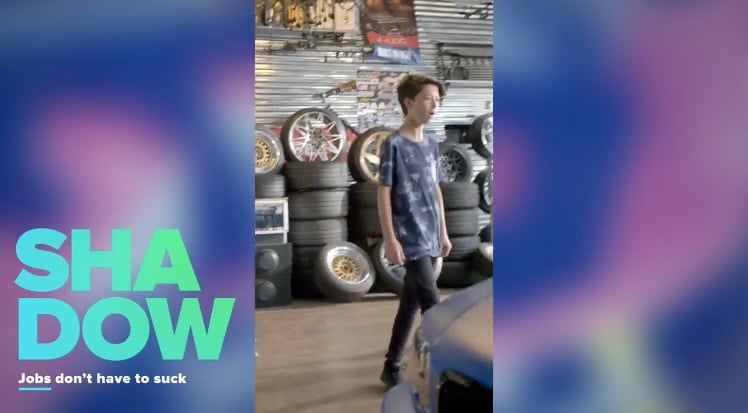This summer, the ASA Center for Career Navigation at JFF launched our first-ever summer internship program—supported by Origami Works—with interns Skylar Brown and Ibrahim Garcia. Throughout the internship, we explored the core principles of career development and addressed the challenges young people face in navigating their career paths.
This experience reinforced the critical importance of the ‘voice of the customer’—in this case, young people—which has been instrumental in guiding our work from the start. We’ve gathered insights from youth all year long through our youth advisory council, focus groups, and research. However, this internship provided a unique opportunity to engage more deeply with the very individuals we aim to serve. The perspectives of Skylar and Ibrahim gave us a fresh lens through which to evaluate the challenges and opportunities in career navigation. It wasn’t just about hearing their experiences; it was about engaging in meaningful dialogue, receiving their honest feedback, and gaining actionable insights on how we can better support youth on their career journeys.
We asked ourselves some essential questions: What does career navigation truly mean to young people today? What barriers are they facing? And most importantly, how can we, as an organization, make a real impact in helping them successfully navigate their career paths? The lessons that emerged from these discussions have reshaped our approach and will guide our work moving forward.
- The Future Me Starts Today. One of the most powerful concepts that emerged from our discussions was the idea that career navigation isn’t just about where you want to go; it’s about how today’s decisions shape tomorrow’s path. One intern posed the question, “What is the me of today doing to help the me of tomorrow?” This concept, that every choice made today has a direct impact on one’s future career, really struck a chord. For many young people, thinking about their “future self” can feel distant and abstract. But when they begin to recognize that their current actions—whether in terms of skill development, education, or work experience—directly contribute to their future, it creates a sense of agency. This insight helped us understand how to frame career development not as a future goal, but as a continual, present process.
- Career Navigation is About Two Key Questions: What Do You Want to Do, and How Do You Get There? At the heart of career navigation are two simple but profound questions: “Do you know what you want to do?” and “Do you know how to get there?” We discussed how career navigation feels overwhelming when you don’t know how to break it down. By focusing on these two questions, we can make the process more straightforward and give young people a clearer sense of direction. It’s not just about discovering what they want to do; it’s also about understanding the steps to get there. This approach, which emphasizes breaking career paths into manageable steps, is key to making career navigation feel more achievable and less daunting for young people.
- Career Navigation is Age and Developmentally Dependent. It became clear that career navigation must be tailored to the developmental stage and age of the individual. For younger youth, the focus should be on exploration and self-discovery—understanding interests, strengths, and potential career paths. At this stage, there’s more room for experimentation and learning through new experiences, which helps build a foundation for more focused career planning later on. For older youth, there’s a greater sense of urgency to make concrete decisions. We discussed how guidance should both empower and challenge young people. One intern suggested that they were “scared a bit” into action. Sometimes, that’s exactly what’s needed—a little push to activate their sense of responsibility for the future.
- Be Mindful of the ‘Lifelong Learning’ Conversation. While lifelong learning is often emphasized in career development, we learned that it can sometimes overwhelm young people, especially those with negative educational experiences. One intern shared, “Talking about lifelong learning can scare them.” For many, the idea of endless learning feels like a burden or a reminder of past failures. Instead of framing learning as a never-ending cycle, we need to present it as an empowering opportunity for growth and skill-building. For youth who have struggled with formal education, learning should be seen as a tool for personal and professional development, not an endless series of tests and qualifications. Career navigation isn’t just about formal education; it’s about continuously learning from experiences, mentors, and challenges in a way that feels manageable and motivating.
- Quick Money vs. Steady Money: Understanding the Balance. As we’ve seen in the rise of side hustles and entrepreneurial ventures, Gen Z is increasingly interested in “quick money”—building businesses, launching creative projects, and exploring entrepreneurial ventures. Advice on making “quick money” can be found all over social media. However, our interns also recognized the importance of introducing the concept of “steady money”—the reliable income that comes from a long-term career plan. This tension between fast money and steady income became an important point of discussion. We realized that it’s not an either/or situation, but rather a balance. While side hustles and entrepreneurship are exciting and can offer financial freedom, career navigation needs to also help young people see the long-term value of stability and steady income. By understanding how career navigation can lead to both financial security and personal fulfillment, young people can better navigate the balance between short-term opportunities and long-term goals.
- Lifting Transferable Skills is Essential. Many young people, especially those in creative-, opportunity-, and talent-based fields like sports and music, struggle to see how their skills can transfer to other career paths. We discussed how important it is for youth to recognize that skills such as teamwork, leadership, and performance—often developed in these fields—are highly transferable. Career navigation should not just focus on specific career paths but also on helping young people recognize the broader application of their talents and interests. Encouraging young people to see the value of their transferable skills opens up new possibilities and helps them approach career exploration with greater confidence.
- Breaking Down Barriers Around Career Options. A powerful story came from one of our interns, who shared how their high school principal told the student body that if they were interested in trade school, they should “go somewhere else.” This kind of messaging creates a hierarchy of careers, where certain paths—like vocational education or trade schools—are stigmatized. It’s crucial that we work to break down these barriers and support young people in pursuing the career path that is best for them. Counselors and educators must recognize this hierarchy and help break down the barriers that prevent young people from seeing all of their options.
- Exploring Career Options Through Social Media. Our interns also shared how social media is a critical tool for exploring career paths, yet many are unsure of how to use it effectively. Social media platforms, when used strategically, can help young people discover careers they may not have considered otherwise; otherwise, they are “stuck with what they know” in terms of careers and education pathways. But many don’t know what to search for or how to explore career options beyond what they already know. Helping young people learn how to use social media as a tool for exploration and learning can significantly enhance their career navigation process. It’s not just about what they already know; it’s about discovering new opportunities and ways to pursue their interests.
- Finding the Right Balance in Career Guidance. Career navigation requires balancing guidance with space for exploration. One piece of advice was that counselors and mentors should “pump the brakes” and avoid pushing too hard. Jumping straight into questions like “What major do you want?” or “Where are you going to school?” can overwhelm young people and lead to unnecessary stress. However, it’s also important to provide structure and direction. One intern shared, “I wish my mom had forced me to do this,” after a discussion of all of the activities entailed in career navigation, such as self-discovery, career exploration, and work-based learning. By finding the right balance between guidance and exploration, young people will feel more confident in their decisions and empowered to take charge of their career path.
- Challenging Myths and Self-Limiting Thoughts. A significant barrier to career navigation is the self-limiting beliefs and myths young people hold, such as thinking they can’t afford college or that they aren’t capable of succeeding in a particular field. These misconceptions can prevent them from exploring careers they could truly enjoy and succeed in. To help young people challenge these beliefs, encourage them to ask themselves simple, reflective questions that get to the heart of their concerns. One effective strategy is the “5 Whys”—asking “why” repeatedly until they reach the root cause of their thinking. For example, they might ask, “Why do you think this isn’t an option for you?” followed by, “Why do you believe that’s true?” Then, they might ask, “What makes you think that’s impossible?” and continue digging deeper with more “whys” until they get to the root of the fear or misconception. This process can help uncover new perspectives and reveal possibilities that may have been overlooked, such as realizing they can pursue their passion in ways they hadn’t previously considered. By encouraging young people to question these self-limiting beliefs, we can help them break down barriers and open their minds to new career paths they may not have imagined.
Final Thoughts: Intern Accomplishments and Moving Forward. Interns Skylar and Ibrahim have been instrumental in the success of this program, contributing to key projects that will shape the future of career navigation. They supported marketing efforts, helped build a career navigation curriculum, and contributed to a prototype of a new career navigation product. Their insights, ideas, and hard work have left a lasting impact on the center. These young voices remind us that by listening to youth, understanding their needs, and empowering them to take charge of their careers, we can create lasting change. As we move forward, we remain committed to applying the lessons we’ve learned this summer, ensuring the young people we serve are equipped with the tools, knowledge, and support they need to succeed in navigating their careers.







